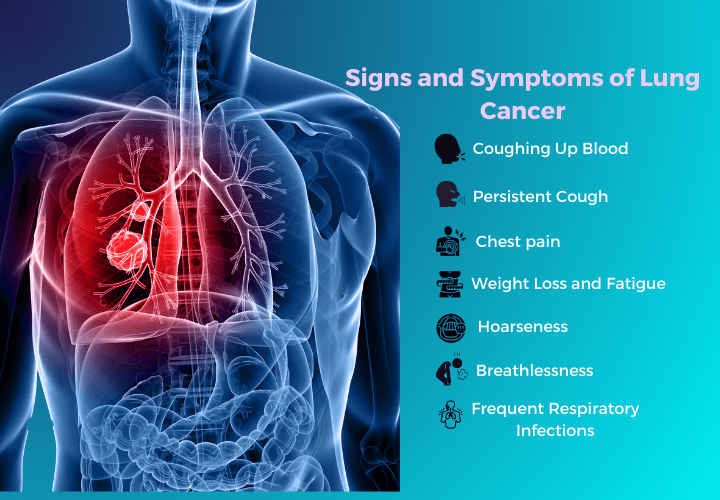Lung Cancer: Signs, Diagnosis, and Treatment Options

Lung Cancer: Signs, Diagnosis, and Treatment Options
- onco
- November 5, 2024
Lung cancer is one of the most common and serious cancers globally, affecting millions of lives every year. In India, with increasing environmental factors and smoking habits, lung cancer has become a significant health concern. For patients seeking reliable cancer treatment in Delhi, choosing the right facility is essential for a holistic approach to treatment. Leading facilities like the best oncology hospital in Delhi offer advanced diagnostic and therapeutic options to treat lung cancer effectively. Awareness of lung cancer symptoms, knowing the diagnostic process, and understanding treatment options can make a vital difference in patient outcomes and quality of life.
Understanding Lung Cancer: Types and Causes
Lung cancer starts when abnormal cells in the lung grow uncontrollably, forming tumors that can interfere with the lung’s ability to function correctly. There are two primary types of lung cancer:
- Non-Small Cell Lung Cancer (NSCLC): Accounts for about 85% of lung cancer cases. It grows slower and includes subtypes like adenocarcinoma, squamous cell carcinoma, and large cell carcinoma.
- Small Cell Lung Cancer (SCLC): A faster-growing, aggressive type, more likely to spread to other body parts.
Lung cancer can develop due to several factors, primarily:
- Smoking: About 85% of lung cancer cases are attributed to tobacco use. Even secondhand smoke exposure can increase risk.
- Radon Exposure: Radon gas, naturally found in soil, can accumulate in homes and increase the risk of lung cancer.
- Environmental and Occupational Factors: Long-term exposure to asbestos, arsenic, air pollution, and industrial chemicals.
- Genetic Factors: Family history of lung cancer can raise susceptibility.
Understanding these factors can aid in prevention and help high-risk individuals seek regular screenings to catch lung cancer early.
Recognizing the Signs and Symptoms of Lung Cancer
Early detection of lung cancer significantly improves treatment effectiveness. Some symptoms, especially in the early stages, can be mistaken for other respiratory conditions. However, if symptoms persist, it’s crucial to seek medical consultation, preferably at facilities known for high-quality cancer treatment in Delhi. Common signs of lung cancer include:
- Persistent Cough – A chronic cough lasting more than three weeks, especially if it worsens over time.
- Coughing Up Blood (Hemoptysis) – Blood in cough or sputum may be an early warning sign.
- Chest Pain – Pain in the chest, shoulders, or back that worsens with deep breathing or coughing.
- Breathlessness – Difficulty breathing or shortness of breath, often due to tumor growth obstructing airways.
- Unexplained Weight Loss and Fatigue – Sudden, unintended weight loss and constant tiredness can signal cancer.
- Hoarseness – If cancer affects the nerves leading to the voice box, it can result in a raspy or hoarse voice.
- Frequent Respiratory Infections – Repeated episodes of pneumonia or bronchitis can occur if tumors obstruct air passages.
Diagnosis of Lung Cancer: Essential Steps
Accurate diagnosis is key to determining the appropriate treatment. The best oncology hospital in Delhi utilizes a range of diagnostic tools and tests to evaluate lung cancer stages accurately. The most common diagnostic steps include:
- Imaging Tests
- X-rays: Often the first test to identify lung abnormalities.
- CT Scans: Provides cross-sectional, detailed images, helping detect smaller tumors that may not show up on X-rays.
- PET Scans: Helps determine if cancer has spread to other parts of the body.
- Sputum Cytology
- Analysis of mucus or phlegm from a patient’s cough can reveal the presence of cancer cells.
- Biopsy
- Bronchoscopy: A procedure where a camera is inserted through the airways to collect tissue samples.
- Fine Needle Aspiration: A thin needle is used to remove a small tissue sample from the lung for examination.
- Thoracoscopy: A minimally invasive procedure to take tissue samples from the chest.
- Molecular Testing
- Used to analyze cancer cells for specific gene mutations, helping to customize treatment options for certain lung cancers.
Timely and accurate diagnosis helps doctors at the best hospital for blood cancer in Delhi recommend the most effective treatment plan for each patient.
Lung Cancer Treatment Options
Treatment for lung cancer is personalized based on the type, stage, and location of the cancer, as well as the patient’s overall health. Top hospitals in Delhi provide comprehensive options:
- Surgery
- Lobectomy: Removes an entire lobe of the lung.
- Pneumonectomy: The removal of an entire lung, usually for more extensive cancer cases.
- Segmentectomy or Wedge Resection: Removes only the affected part of the lung, often used in early stages.
Surgery is generally recommended for early-stage lung cancer and may be followed by chemotherapy or radiation to reduce the chance of recurrence.
- Radiation Therapy
- External Beam Radiation: High-energy beams target cancer cells, often combined with other treatments.
- Brachytherapy: Internal radiation where radioactive material is placed near or inside the tumor.
Radiation is effective both as a primary treatment and for palliative care in advanced stages to relieve pain and symptoms.
- Chemotherapy
- Chemotherapy uses drugs to kill cancer cells and is often recommended for advanced stages or post-surgery to prevent recurrence. Combination therapies with multiple drugs may be used to enhance treatment efficacy.
- Targeted Therapy
- Targeted therapy works by focusing on specific genes, proteins, or the tumor’s environment that support cancer growth. It’s effective for patients with specific genetic mutations.
- Immunotherapy
- Immunotherapy boosts the body’s immune system to fight cancer. It’s particularly helpful in advanced stages when conventional therapies are less effective.
- Palliative Care
- Palliative care is essential for symptom management and quality of life in advanced cancer stages. This supportive care ensures that patients have access to pain relief, counseling, and other resources to ease the cancer journey.
Delhi’s advanced cancer treatment facilities, including the best oncology hospital, provide a range of these treatments to maximize patient outcomes and ensure holistic care.
The Role of Lifestyle and Supportive Care
In addition to medical treatments, lifestyle and supportive care play an integral role in managing lung cancer. Here are some key aspects:
- Nutrition: A balanced diet supports immune function and helps manage treatment side effects.
- Exercise: Gentle exercise, as recommended by doctors, can improve lung capacity, stamina, and mental well-being.
- Smoking Cessation: Quitting smoking can slow disease progression, improve treatment efficacy, and lower recurrence risk.
- Emotional Support: Counseling, support groups, and mental health support can help patients and families cope with the challenges of a cancer diagnosis.
Supportive care provided at the best hospital for blood cancer in Delhi also includes tailored programs for patients and families, ensuring that both physical and emotional needs are met throughout the treatment process.
Preventive Measures and Early Detection
Preventing lung cancer involves minimizing exposure to risk factors and maintaining regular screenings, especially for high-risk individuals. Important steps include:
- Avoiding Tobacco: Avoiding smoking or quitting tobacco is the most effective way to prevent lung cancer.
- Radon Testing: Ensuring that home radon levels are within safe limits.
- Healthy Lifestyle Choices: Consuming a balanced diet, staying physically active, and avoiding pollutants can help reduce lung cancer risk.
- Regular Screenings: High-risk individuals, such as smokers or those with a family history, should consider annual lung screenings.
Conclusion
Lung cancer is a challenging condition, but advancements in treatment and early detection have greatly improved patient outcomes. Patients in India, especially those seeking cancer treatment in Delhi, have access to cutting-edge facilities and a team of dedicated specialists at the best oncology hospital in Delhi. From advanced diagnostic tests to personalized treatment plans, patients benefit from comprehensive care that includes emotional support and lifestyle guidance. By recognizing symptoms early, staying informed about treatment options, and choosing a top facility, individuals can navigate lung cancer with the best support and resources available.





Leave a Reply